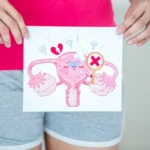A Nabothian cyst develops on the surface of cervix because mucus-producing glands become blocked which trapping fluid in them. The glands in the cervix release mucus, but the blocked passages cause fluid to collect there. Most blood-filled Nabothian cysts cause no harm, yet some women may need medical help to address pain or other effects.
Most women realize they have these cysts for the first time after having a pelvic examination. Mini Nabothian cysts on the cervix normally stay unnoticed without any medical supervision. When cysts are small, doctors typically let them be, and they do not require treatment but larger growths or uncomfortable feelings require doctor treatment.
This article explains how Nabothian cysts appear in the cervix, and describes all associated medical aspects of this condition. It also highlights the right time to visit a gynecologist in Delhi.
Meaning and Causes
A Nabothian cyst in the cervix forms when the small mucus-secreting glands in the cervix become blocked. The trapped mucus creates a cyst-like structure. These cysts are also called epithelial inclusion cysts and are considered a normal part of cervical changes.
What Causes Nabothian Cysts?
The most common causes include:
- Healing after childbirth: The cervix undergoes changes during labor, sometimes leading to blocked glands.
- Cervical trauma: Physical injury or irritation, such as after gynecological procedures, may cause cyst formation.
- Hormonal changes: Estrogen fluctuations during menstruation, pregnancy, or menopause can affect cervical mucus production.
Women with multiple Nabothian cysts in the cervix may develop them due to ongoing hormonal shifts or repeated gland blockages.
Common Symptoms of Nabothian Cysts in the Cervix
Most Nabothian cysts do not cause noticeable symptoms. However, if they become large or multiple, they may lead to:
- Pelvic discomfort or pressure
- Pain during sexual intercourse
- Unusual vaginal discharge
- Mild bleeding after intercourse
If you experience any of these symptoms, consult an obstetrician in Rohini to rule out other conditions.
How Doctors Diagnose Nabothian Cysts in the Cervix?
A Nabothian cyst in the cervix is usually detected during a routine pelvic exam. A gynecologist in Delhi may use the following methods to confirm the diagnosis:
1. Pelvic Examination
A doctor examines the cervix using a speculum to check for visible cysts. Small Nabothian cysts in the cervix appear as white or yellow bumps on the cervix’s surface.
2. Transvaginal Ultrasound
This imaging test provides a detailed view of the cervix. It helps determine the size, location, and number of cysts.
3. Colposcopy
If a cyst appears unusual or has irregular features, a colposcopy (a magnified examination of the cervix) may be performed.
4. Biopsy
In rare cases, a biopsy is taken to rule out other conditions, such as cervical polyps or cancer.
Do Nabothian Cysts Require Treatment?
Most Nabothian cysts in the cervix do not need treatment. However, medical intervention is necessary if:
- The cyst grows large and causes discomfort.
- There are multiple Nabothian cysts in the cervix, leading to pressure symptoms.
- The cyst ruptures, causing persistent pain or bleeding.
Medical Treatment for Nabothian Cysts in the Cervix in Delhi
If a Nabothian cyst requires treatment, a doctor may recommend one of the following procedures:
1. Electrocautery
A heated probe or electrical current is used to burn and remove the cyst. This is a quick outpatient procedure performed under local anesthesia.
2. Cryotherapy
Liquid nitrogen is applied to freeze and destroy the cyst. This procedure is commonly used for multiple Nabothian cysts in the cervix that are causing symptoms.
3. Needle Aspiration
A fine needle is used to drain the fluid inside the cyst. This is a temporary solution, as the cyst may refill with mucus.
4. Laser Therapy
A laser is used to vaporize the cyst, preventing regrowth. This method is precise and minimizes damage to surrounding tissue.
5. Surgical Removal
If a cyst is large or recurrent, minor surgery may be performed. A gynecologist in Delhi may use local anesthesia to remove the cyst completely.
Can Nabothian Cysts Be Prevented?
There is no guaranteed way to prevent Nabothian cysts. However, certain lifestyle habits may help maintain cervical health:
- Regular gynecological checkups: Routine pelvic exams help detect any cysts early.
- Maintaining vaginal hygiene: Keeping the vaginal area clean prevents infections that may contribute to cyst formation.
- Avoiding unnecessary cervical trauma: Repeated procedures or rough intercourse can irritate the cervix.
- Managing hormonal health: A balanced diet and lifestyle support hormone regulation.
If you have a history of multiple Nabothian cysts in the cervix, discuss preventive strategies with an obstetrician in Delhi.
When to See a Gynecologist for Nabothian Cyst Treatment?
While Nabothian cysts are usually harmless, see a doctor if you experience:
- Pelvic pain or pressure that does not go away.
- Unusual vaginal discharge with a foul odor.
- Bleeding after intercourse or between periods.
- Frequent cyst recurrence despite treatment.
A specialist in cyst treatment for females in Rohini can assess your condition and recommend the best approach.
Best Gynecologists in Delhi for Nabothian Cyst Treatment
Finding the right gynecologist in Delhi is crucial for proper diagnosis and treatment. Look for doctors with:
- Experience in cervical health and cyst removal
- Advanced diagnostic tools for accurate evaluation
- A patient-focused approach to treatment
For those looking for obs & gyne in Rohini, several top-rated specialists offer expert care for Nabothian cysts and other gynecological concerns.
Nabothian cysts in the cervix are usually harmless, but some may require treatment if they cause discomfort. Regular gynecological checkups, proper hygiene, and medical evaluation help ensure early detection and treatment.
For expert care, visit a trusted gynecologist in Delhi. If you need specialized treatment, Manasvi Healthcare provides safe and effective solutions for managing Nabothian cysts and other gynecological concerns.




